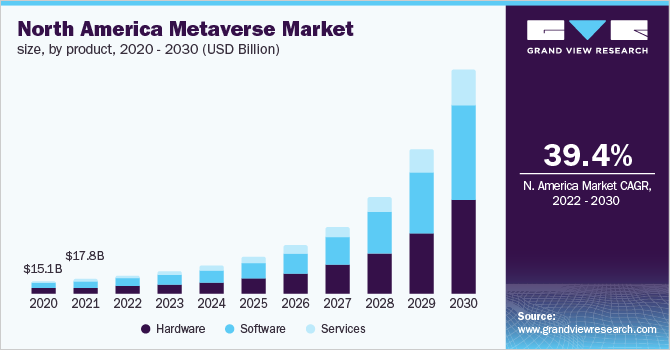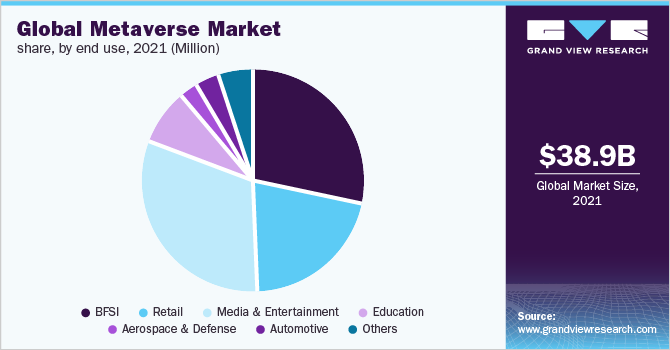The metaverse holds endless possibilities for the entertainment and media industry. The future of entertainment in this technology is influenced by critical verticals, including exploring immersive storytelling & experiences, unlocking individual creativity, and developing new worlds. The business plan of a software startup in the metaverse should clearly articulate the company’s vision for its virtual world, its target audience, and its monetization strategy. Within the metaverse concepts like 3D avatars, digital interactive spaces, and transmedia will propel a significant shift in how each interacts with each other and the digital media content that individuals consume.
There is a creation of combined interoperable virtual spaces where individuals can select between myriad digital entertainment services, venues, and events in harmony with their preferences. However, these digital media streams and virtual events will foster the expansion of a borderless metaverse: a continuous, unified, and persistent virtual realm wherein users will be free to explore, create, and interact with different environments and other participants.
Considering metaverse potential for immersive storytelling and interactive world-building, the edifice of real-life virtual spaces for the entertainment industry will be fetched to life in the spatial universe. Undoubtedly, the metaverse is in infancy; it has shown the potential to transform the entertainment world forever.
What is Metaverse?
The metaverse refers to increasing online 3D or virtually integrated environments and offers users access to augmented and virtual reality experiences. Digital Marketing Importance in the Metaverse will lie in understanding and catering to the unique needs and behaviors of users in this immersive virtual world. The metaverse has the potential to transfigure the fundamental nature of social interactions and digital media consumption for anyone with an internet connection.
The metaverse market is forecasted to grow and reach around 38.85 billion in 2021. Furthermore, it’s projected to grow at 39% of the CAGR between 2022 and 2030. Primary aspects driving revenue growth include increasing focus on the integrated physical and digital world using the internet, growing momentum, and popularity of AR, VR, and MR.

Source: (GrandView Research)
The COVID-19 outbreak and subsequent situations developments and outcomes have resulted in increasing the popularity of metaverse. Due to the growing gaming industry, the entertainment and media category is projected to account for 31% revenue growth over the forecasted period.

Source: (GrandView Research)
Business owners are focusing on organizing virtual music shows, and the adoption of this vision by an increasing number of businesses is likely to increase this segment’s revenue growth.
How Does Metaverse Impact the Entertainment Industry?
The role of NFTs and metaverse in supporting virtual assets is becoming crucial in the entertainment and media industry. Metaverse has opened huge opportunities for entrepreneurs. With online streaming services’ growth, there is a huge demand for digital assets and trade. NFTs offer a secure way to transfer and track assets; the early metaverse adoption is well-suited for the segments.
Due to Covid-19, customer behavior changes in the entertainment industry are evident. Business owners opt for modern technologies to secure the market and have competitive benefits. Metaverse caters to the needs by offering verifiable NFTs for digital assets; check more to explore metaverse and NFT roles in the entertainment industry.
Virtual Concerts
Metaverse provides interesting opportunities for the entertainment sector by providing new revenue channels. Let’s begin with the music sector. It has become harder to make money for a musician on platforms like Spotify or any other. They get paid a small amount when they get millions of listeners. However, it’s difficult to break into this sector as such platforms choose titles based on rhythmic curation instead of individual tastes.
The metaverse provides musicians with a lot of opportunities to do online concerts and enrich the musical experience of fans via new types of online experiences. For example, Warner Music Group launched a virtual musical concert in “The Sandbox metaverse.” Add NFT as these non-interchangeable units of information stored on a blockchain and get more monetization options.
Musicians can sell their content to their fans as non-fungible tokens. They can do something the same as the American band King of Leon did. They generated around 2 million from NFT sales of their new album. Artists can sell new albums as NFTs that would come with unique perks like free concert tickets, a collector version of some extra bonus tracks, and physical records.
Provides You the Opportunity to Become Part of Something Bigger
Metaverse is no longer limited to the music sector. An artist called Beeple sold his well-known work for $69 million via the renowned Christie’s auction house. High-quality video content can be a powerful tool for engaging and immersing users in the metaverse. The NBA utilizes NFTs to sell some video clips of well-known players and a few NBA-licensed digital items, while most 20 Premier League clubs are seeking to launch NFTs to sell collectible historical memorabilia to fans.
Many music artists and business entrepreneurs choose to join this growing industry. They are investing in metaverse development services to generate great revenue. The idea of becoming part of the metaverse will definitely help you to become part of something bigger.
Improved Sports Games
Metaverse provides the entertainment industry with lots of opportunities to design improved experiences. The metaverse foregrounds the idea of the viewer’s avatar/identity/presence as being relevant instead of being viewers/users at a terminal; most are opting for digital content at least adjacent to it. The interesting use cases are those that are to make viewers’ presence appropriate to the experience.
Entertainment in Metaverses
The entertainment industry has experienced a great jump due to the COVID-19 pandemic. The overall industry offering can be divided into two categories:
1. Content
2. Experiences
Regardless of format, the content side of the business is shifting towards broad digital categories; however, the experiences are shifting from offline channels to virtual spaces. The additive value of the metaverse that can be created for entertainment brands essentially boils down to various functions like world-building, unlocking fan creativity, and more. Each boosts audience engagement and prioritizes the modern entertainment brand.
Immersive Storytelling
Storytelling forms the content business basis, regardless of its distribution and format channel. Metaverses charge the storytelling capability with interactivity and deep immersion. It also gamifies the portrayals to assist the suspension of disbelief and create affinity.
Besides consuming content, viewers can become spectators or active participants in the narrative, leading to emotional investment and a heightened sense of agency. The line between experience and entertainment content would be blurred in metaverses.
Interactive content is no more new at this point; from HBO elaborating on non-linear content with Mosaic to Netflix’s intriguing attempts at building “choose-your-adventure episodes,” content creators have experimented with new formats to boost viewer engagement. Moreover, 2D interactive content lacks the immersion that a 3D interactive experience can provide.
Today, video games provide the most engrossing mythical narratives that the entertainment industry has to present, and the elevation of the metaverse will make that evident, pushing content creators to experience the power of immersive storytelling.
VR content has been applauded by lots of immersion, and there is a far-off metaverse version that will be accessible through VR. VR content remains limited until virtual reality hardware is adopted and picks up.
Unlocking Fan Creativity
The increasing use of metaverse enables fans to build their own narratives out of existing IP, bringing things such as fan edits and fiction to a logical next step of their evolution. The open-worldness of the metaverse naturally enables users to assemble new stories and characters, but it even invites users to engage with existing IP through interactions or roleplaying, authorized or not.
Teaming with fans can be complicated; entertainment brands nowadays desire to protect their franchises & brands and provide the demand for moderate user-generated content. Moreover, the content creation nature has been shifting.
With democratized digital creativity boost, most content comes from anywhere, including TikTok stars and professional content studios placed on a leveled playing field to contend for audience attention, both at the mercy of recommendations and algorithmic feeds.
TikTok users come together to build a crowdsourced musical based on Pixar’s Ratatouille. Whether the IP owners like it or not, equivalent initiatives will inevitably pop up in the metaverse. It might become a fool’s errand wanting to stamp out unauthorized fan creations in metaverses.
Tapping into the growing source can be a big opportunity; brands can refrain from monetizing user-generated content for safety reasons, but it might be a better approach to grant access to IP assets and engage fandoms to moderate user-generated content and experiences in the metaverse.
Conclusion
We have listed top concerts where the audience can interact with the artist, but they can go far beyond. For example, take sports. In the metaverse, you can experience the VR version of a game so that you can hang out with your friend. You can move around with them to benefit from virtual content.
Today, we can watch sports on TV, and you are presented with replays in 3D while the broadcasters move around the space, describing why that player did this and how it permitted another one to do that. Soon we can have a metaverse in real-time, and you will be able to move around the scene to look at it from each possible angle. You just need to pick the camera to watch the game via the eyes of your favorite players.
Author’s Bio:
Gaurav Kanabar is the Founder and CEO of Alphanso Tech, an India-based IT Consulting company that provides NBA NFT Marketplaces, video streaming app like cameo, and music platform development services to individuals as per their specific demands.Twitter || Linkedin
